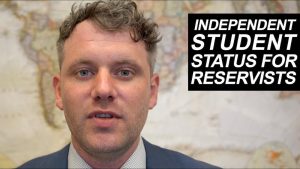During the recent U.S. Department of Education rulemaking hearings to consider proposed rules impacting higher education, veterans organizations, including VEP, called for committee members to consider the interests of veterans and their families. This key stakeholder group spoke out in opposition to 90/10 rules that will restrict their education choice, and called for policies that treat all schools equally and are supported by data. Below is a compilation of their statements delivered at the public hearings.
Steve Patterson, Executive Director for the Veterans Education Project“Veterans deserve the freedom to choose the institutions that best fit our lives to advance our lives. We are not asking for special treatment, just equal treatment when it comes to holding non-traditional schools and career schools to the same standards as all other schools – whether for-profit or nonprofit, public or private.“It is frustrating to try to understand how policymakers can so easily look past the great number of underperforming public institutions—where Veterans overwhelmingly enroll–and not hold these schools to the same standards as private institutions. This is especially concerning, as changing the 90/10 rule will force a significant number of private schools that serve veteran students to make a choice: close their doors for good, or close their doors to Veterans.”Jason Beardsley, Executive Director of the Association of the United States Navy“ . . . these restrictions on Veterans’ earned education benefits will not only hurt our Veteran members, their families, and their earning potential, but also Navy morale, and recruitment and retention throughout our armed forces. These restrictions on our members’ earned benefits will greatly limit their education options, and outright deny our members their earned benefits at their program of choice . . . Our members attend institutions in all sectors of higher education, but there is a deafening silence when it comes to holding all sectors of higher education accountable. . . Simply increasing transparency of a program’s student outcomes will do much to safeguard our veterans’ earned benefits, as they know how to choose which path is best for themselves.”Kevin Hollanger, legislative director for the Enlisted Association of the National Guard of the United States“The National Guard has been deployed at historic rates over the past three years. They have earned the right to choose the school they believe will serve them best. Over the course of the pandemic, many have had to leave school for extended periods of time or move online. Many of the colleges that have best adapted to the needs of Veterans and Servicemembers are in the private sector. Yet the 90/10 rule and associated legislation single out this sector while turning a blind eye to public and non-profit schooling . . . We seek a policy that is driven by the data collected on student outcomes, not federal inflows. The latter is a poor-man’s weathervane when assessing quality of education.Travis Peterson, former student veteran and founding member of the Moral Compass Federation“It is apparent that 90/10 doesn’t care about student outcomes, which in my opinion means it doesn’t actually care about protecting student veterans’ earned benefits. It doesn’t improve transparency about student outcomes for veteran students, and it doesn’t even apply to the majority of schools that veterans attend. If this rule is going to be anything but harmful to veterans, there need to be mechanisms in place that take into account a failing school’s student outcomes and will allow veterans to still use their benefits if the school has good outcomes.Levi Sadr, legislative director for the Non-Commissioned Officers Association and current military-affiliated student“Non-commissioned officers, or NCOs, are the backbone of the American fighting force. They know how to get missions done and bring our folks home safe. So, it does not make sense to doubt their wisdom when it comes to school choice. Such limits create new limits on their earned benefits, degree options, and ultimately their future. . . The 90/10 rule assesses a college’s quality by its sources of revenue. Hence, if too many veterans want to attend a particular institution, the 90/10 rule punishes this success which it views as a failure. Instead of making the decision for our veterans, we should equip them with the tools they need to make better decisions for themselves.Ryan Ziegler, member and Board member of the Special Operations Association of America “Veterans deserve to pursue their first choice in education at schools with good student outcomes, and who have made the effort to adapt to the needs of nontraditional students, like veteran students. As Veterans enroll in all sectors of education, we would want to see data-driven policy that regulates all of higher education. There have been some discussions we think are promising, however, and which would greatly benefit veteran students at all institutions. Simply publishing the Gainful Employment data of all institutions at the programmatic level would greatly improve transparency for disadvantaged consumers, and would allow veterans to pursue programs based on real merit.”




